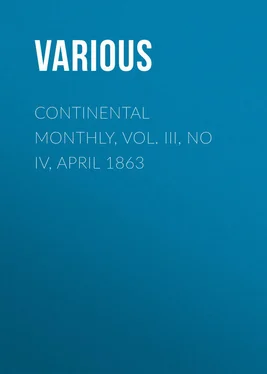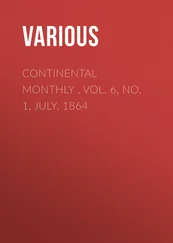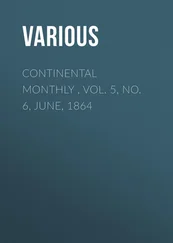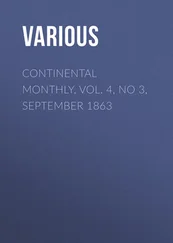Various - Continental Monthly, Vol. III, No IV, April 1863
Здесь есть возможность читать онлайн «Various - Continental Monthly, Vol. III, No IV, April 1863» — ознакомительный отрывок электронной книги совершенно бесплатно, а после прочтения отрывка купить полную версию. В некоторых случаях можно слушать аудио, скачать через торрент в формате fb2 и присутствует краткое содержание. Жанр: periodic, Языкознание, periodic, foreign_edu, на английском языке. Описание произведения, (предисловие) а так же отзывы посетителей доступны на портале библиотеки ЛибКат.
- Название:Continental Monthly, Vol. III, No IV, April 1863
- Автор:
- Жанр:
- Год:неизвестен
- ISBN:нет данных
- Рейтинг книги:5 / 5. Голосов: 1
-
Избранное:Добавить в избранное
- Отзывы:
-
Ваша оценка:
- 100
- 1
- 2
- 3
- 4
- 5
Continental Monthly, Vol. III, No IV, April 1863: краткое содержание, описание и аннотация
Предлагаем к чтению аннотацию, описание, краткое содержание или предисловие (зависит от того, что написал сам автор книги «Continental Monthly, Vol. III, No IV, April 1863»). Если вы не нашли необходимую информацию о книге — напишите в комментариях, мы постараемся отыскать её.
Continental Monthly, Vol. III, No IV, April 1863 — читать онлайн ознакомительный отрывок
Ниже представлен текст книги, разбитый по страницам. Система сохранения места последней прочитанной страницы, позволяет с удобством читать онлайн бесплатно книгу «Continental Monthly, Vol. III, No IV, April 1863», без необходимости каждый раз заново искать на чём Вы остановились. Поставьте закладку, и сможете в любой момент перейти на страницу, на которой закончили чтение.
Интервал:
Закладка:
A 'spell' did we say? Perhaps that is not altogether fanciful; for 'spell' itself in the Saxon primarily imports a word ; and we know that the runes or Runic letters were long employed in this way. For instance, Mr. Turner thus informs us ('History of the Anglo-Saxons,' vol. i, p. 169): 'It was the invariable policy of the Roman ecclesiastics to discourage the use of the Runic characters, because they were of pagan origin, and had been much connected with idolatrous superstitions.' And if any one be incredulous, let him read this from Sir Thomas Brown: 'Some have delivered the polity of spirits, that they stand in awe of charms, spells , and conjurations; letters , characters, notes, and dashes.' And have not the Α and Ω something mystic and cabalistic about them even to us?
While on this, let us note that 'spell' gives us the beautiful and cheering expression 'gospel,' which is precisely God's-spell – the 'evangile,' the good God's-news!
To resume:
'Graphical' (γρἁφω) is just what is well delineated — literally , 'well written,' or, as our common expression corroboratively has it, like a book !
'Style' and 'stiletto' would, from their significations, appear to be radically very different words; and yet they are something more akin than even cousins-german. 'Style' is known to be from the στὑλος, or stylus , which the Greeks and Romans employed in writing on their waxen tablets; and, as they were both sharp and strong, they became in the hands of scholars quite formidable instruments when used against their schoolmasters. Afterward they came to be employed in all the bloody relations and uses to which a 'bare bodkin' can be put, and hence our acceptation of 'stiletto.' Cæsar himself, it is supposed, got his 'quietus' by means of a 'stylus;' nor is he the first or last character whose 'style' has been his ( literary , if not literal ) damnation.
'Volume,' too, how perfectly metaphorical is it in its present reception! It is originally just a volumen , that is, a 'roll' of parchment, papyrus, or whatever else the 'book' (i. e., the bark – the 'liber') might be composed of. Nor can we regard as aught other such terms as 'leaf' or 'folio,' which is also 'leaf.' 'Stave,' too, is suggestive of the staff on which the runes were wont to be cut. Indeed, old almanacs are sometimes to be met with consisting of these long sticks or 'staves,' on which the days and months are represented by the Runic letters.
'Charm,' 'enchant,' and 'incantation' all owe their origin to the time when spells were in vogue. 'Charm' is just carmen , from the fact that 'a kind of Runic rhyme' was employed in diablerie of this sort; so 'enchant' and 'incantation' are but a singing to – a true 'siren's song;' while 'fascination' took its rise when the mystic terrors of the evil eye threw its withering blight over many a heart.
We are all familiar with the old fable of The Town Mouse and the Country Mouse . We will vouch that the following read us as luminous a comment thereon as may be desired: 'Polite,' 'urbane,' 'civil,' 'rustic,' 'villain,' 'savage,' 'pagan,' 'heathen.' Let us seek the moral:
'Polite,' 'urbane,' and 'civil' we of course recognize as being respectively from πὁλις, urbs , and civis , each denoting the city or town — la grande ville . 'Polite' is city-like ; while 'urbanity' and 'civility' carry nothing deeper with them than the graces and the attentions that belong to the punctilious town. 'Rustic' we note as implying nothing more uncultivated than a 'peasant,' which is just pays -an, or, as we also say, a 'countryman.' 'Savage,' too, or, as we ought to write it, salvage , 9 9 See the Italian setvaggio and the Spanish salvage , in which a more approximate orthography has been retained.
is nothing more grim or terrible than one who dwells in sylvis , in the woods – a meaning we can appreciate from our still comparatively pure application of the adjective sylvan . A 'backwoodsman' is therefore the very best original type of a savage ! 'Savage' seems to be hesitating between its civil and its ethical applications; 'villain,' 'pagan,' and 'heathen,' however, have become quite absorbed in their moral sense – and this by a contortion that would seem strange enough were we not constantly accustomed to such transgressions. For we need not to be informed that 'villain' primarily and properly implies simply one who inhabits a ville or village . In Chaucer, for example, we see it without at least any moral signification attached thereto:
'But firste I praie you of your curtesie
That ye ne arette it not my vilanie .'
So a 'pagan,' or paganus , is but a dweller in a pagus , or village; precisely equivalent to the Greek κωμἡτης, with no other idea whatever attached thereto; while 'heathen' imported those who lived on the heaths or in the country, consequently far away from civilization or town-like-ness .
From all of which expressions we may learn the mere conventionality and the utter arbitrariness of even our most important ethical terms. How prodigiously cheap is the application of any such epithets, considering the terrible abuse they have undergone! And how poor is that philosophy that can concentrate 'politeness' and 'civility' in the frippery and heartlessness of mere external city-forms; and convert the man who dwells in the woods or in the village into a savage or a villain ! How fearful a lack do these numerous words and their so prolific analogues manifest of acknowledgment of that glorious principle which Burns has with fire-words given utterance to – and to which, would we preserve the dignity of manhood, we must hold on —
'A man's a man for a' that!'
Ah! it is veritably enough to make us atrabiliar! Here we see words in their weaknesses and their meannesses, as elsewhere in their glory and beauty. And not so much their meanness and weakness, as that of those who have distorted these innocent servants of truth to become tools of falsehood and the abject instruments of the extinction of all honesty and nobleness.
The word 'health' wraps up in it – for, indeed, it is hardly metaphorical – a whole world of thought and suggestion. It is that which healeth or maketh one to be whole , or, as the Scotch say, hale ; which whole or hale (for they are one word) may imply entireness or unity; that is to say, perfect 'health' is that state of the system in which there is no disorganization – no division of interest – but when it is recognized as a perfect one or whole; or, in other words, not recognized at all. And this meaning is confirmed by our analogue sanity , which, from sanus , and allied to σἁος, has underneath it a similar basis.
Every student of Carlyle will remember the very telling use to which he puts the idea contained in this word – speaking of the manifold relations of physical, psychal, and social health. Reference is made to his employment of it in the 'Characteristics' – itself one of the most authentic and veracious pieces of philosophy that it has been our lot to meet with for a long time; yet wherein he proves the impossibility of any, and the uselessness of all philosophies. Listen while he discourses thereon: 'So long as the several elements of life, all fitly adjusted, can pour forth their movement like harmonious tuned strings, it is melody and unison: life, from its mysterious fountains, flows out as in celestial music and diapason – which, also, like that other music of the spheres, even because it is perennial and complete, without interruption and without imperfection, might be fabled to escape the ear. Thus, too, in some languages, is the state of health well denoted by a term expressing unity; when we feel ourselves as we wish to be, we say that we are whole .'
Читать дальшеИнтервал:
Закладка:
Похожие книги на «Continental Monthly, Vol. III, No IV, April 1863»
Представляем Вашему вниманию похожие книги на «Continental Monthly, Vol. III, No IV, April 1863» списком для выбора. Мы отобрали схожую по названию и смыслу литературу в надежде предоставить читателям больше вариантов отыскать новые, интересные, ещё непрочитанные произведения.
Обсуждение, отзывы о книге «Continental Monthly, Vol. III, No IV, April 1863» и просто собственные мнения читателей. Оставьте ваши комментарии, напишите, что Вы думаете о произведении, его смысле или главных героях. Укажите что конкретно понравилось, а что нет, и почему Вы так считаете.












